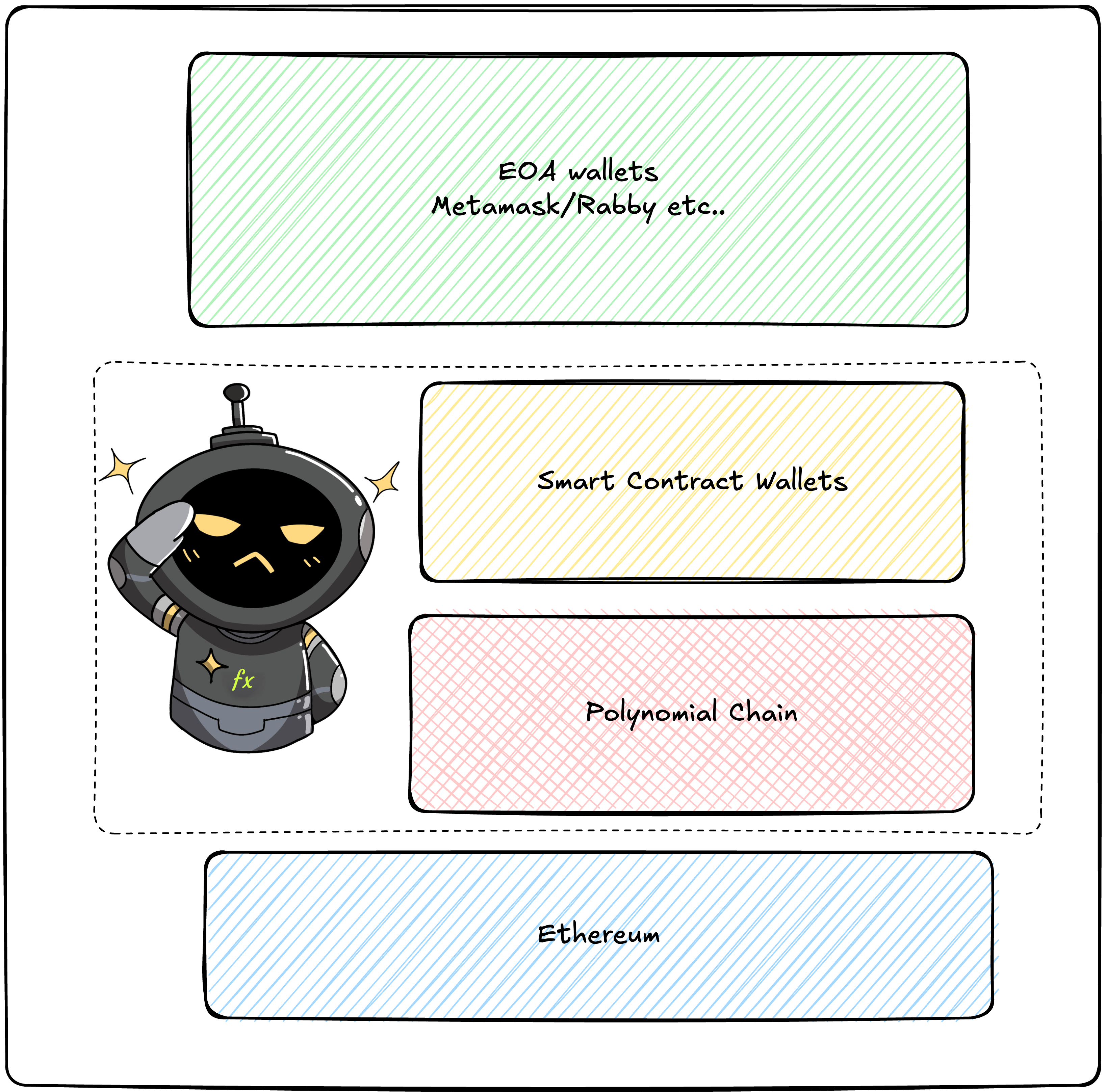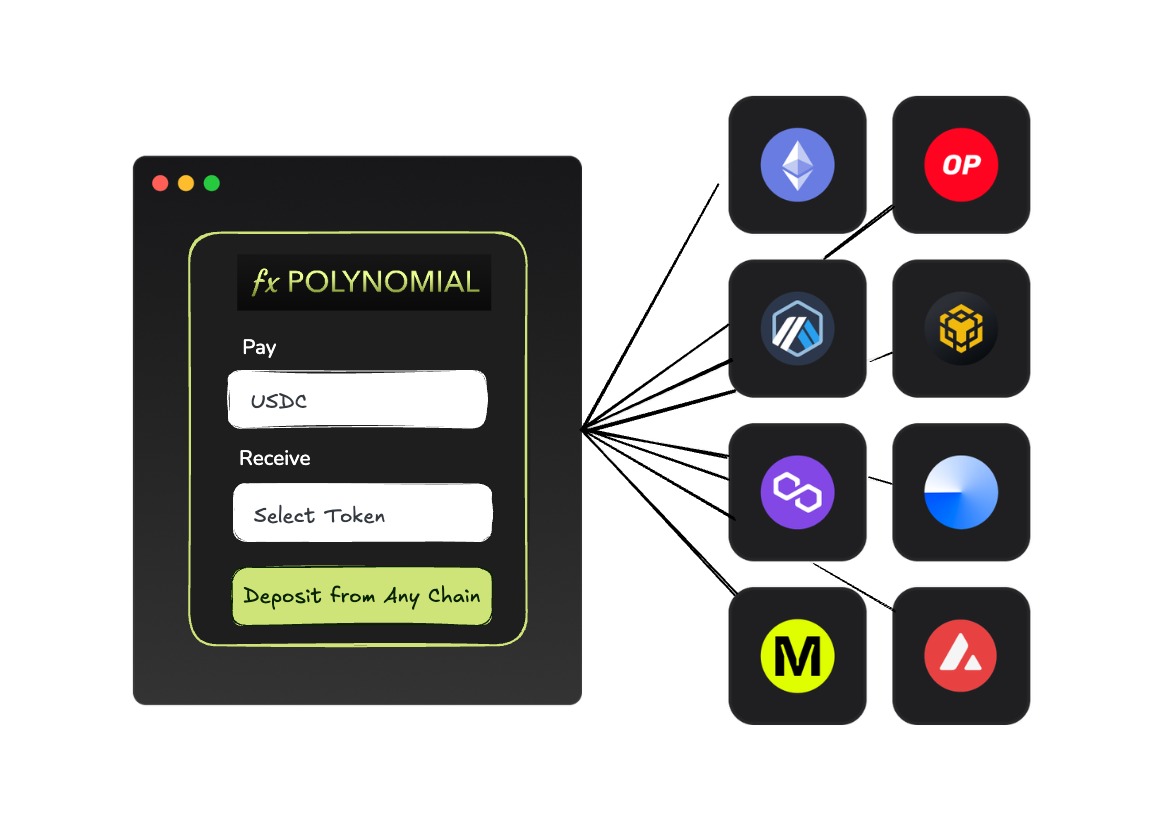In the world of DeFi, derivatives markets offer immense growth potential still in the year 2024. However, current infrastructure and user experience pose significant barriers to widespread adoption and scalability. In 2023, Vitalik Buterin stated “the next 10 years are going to be about really upgrading the ecosystem at the user level.” We can think of no better case for this than on-chain derivatives trading, where centralized exchanges (CEXs) currently account for over 90% of derivatives volume to the tune of over $4.8 TRILLION over a measly $500 BILLION in DEX quarterly volume. That’s where we step in.
Polynomial Chain will deploy with an innovative next-gen Abstraction Layer, encompassing both account and chain abstraction as its bedrock in providing a digital experience with the potential to surpass conventional Web2 platforms without compromising security. Imagine an L2 ceaselessly operating across thousands of chains within a unified interface where with only one click you can onboard yourself from the world of TradFi into the boundlessness of opportunities in DeFi.
Account Abstraction: Enhancing User Experience
Pioneered by Vitalik Buterin and formalized in ERC-4337, account abstraction refers to the concealment of more technical details of on-chain interactions in favor of accessibility and user-friendliness. Polynomial Chain leverages account abstraction to enhance user experience in several ways:
Smart Accounts
Through our partnership with ZeroDev, Polynomial Chain comes preloaded with smart, white-labeled, and modular embedded wallets, special-purpose smart contracts that define and manage user accounts. These smart accounts can be programmed with custom rules for spending coins and transferring assets, implementing advanced features such as social recovery and multi-signature wallets.
We have already created over 4,200 smart accounts showcasing the scalability and security of our infrastructure. These wallets ensure that users can seamlessly bridge and deposit as a staker or trade on-chain without the typical complexities.

Gasless Transactions and Batching
Smart contracts handle gas fees on behalf of users. This reduces friction and makes it more affordable for users to engage in trading. Additionally, batching transactions allows multiple operations to be processed together, further enhancing efficiency. Polynomial has partnered with Alchemy to support paymasters that provide flexible gas policies like allowing dApps to sponsor operations for their users.

Session Keys and Passkeys
Next-gen UI features like session keys and passkeys simplify user interactions with glitchy and annoying interfaces like MetaMask. Session keys enable multiple transactions within a session without repeated authorization, while passkeys provide secure access without traditional passwords.
No More Seed Phrases
Users can create and manage accounts without the need for seed phrases. Smart contract Wallets handle key management and signing operations, reducing the risk of loss and making the process more user-friendly.
User-Friendly Account Recovery
In case of lost access, users can recover their accounts using social recovery information, streamlining the recovery process and enhancing security.
Subsidized Gas Payments
Smart contracts can subsidize gas payments, making it more cost-effective for users to trade derivatives. This feature is particularly beneficial for new users who may be deterred by high transaction fees - without realizing how much they are saving off traditional CEX maker and taker fees!
By simplifying UX and enhancing security, account abstraction makes it easier for more users to participate in derivatives trading, driving adoption and scalability.
Chain Abstraction: Streamlining Cross-Chain Interactions
Chain abstraction provides a seamless way to interact with multiple blockchains, which is essential for scaling derivatives trading. Polynomial Chain’s chain abstraction offers the following benefits:

Global and Chain-Agnostic Access
Polynomial Chain's chain abstraction provides a global and chain-agnostic point of contact for users. This approach abstracts away the complexities of interacting with multiple blockchain networks, allowing users to access and use dApps on Polynomial from any chain.
Aggregated Blockspace
By aggregating blockspace across multiple chains, Polynomial Chain optimizes resource utilization, enhancing the scalability and efficiency of derivatives trading.
Modular Order Flow Auctions (MOFA)
Chain abstraction enables developers to compose with every protocol, user, and asset across 300+ chains and rollups through MOFA. For more info on this, please see our partner Socket Protocol’s blog on chain abstraction.
Achieving Hyper-Scaling in Derivatives Trading
The combination of account abstraction and chain abstraction on Polynomial Chain creates a robust infrastructure for derivatives trading through:
-
Seamless User Experience: By eliminating traditional wallet complexities and enabling user-friendly features, Polynomial Chain makes blockchain interactions as easy as using Web2 applications. This lowers entry barriers and attracts more users to on-chain derivatives markets.
-
Enhanced Security: Smart account infrastructure reduces private key vulnerabilities and offers advanced security features like social recovery and multi-signature wallets, building trust and confidence among users.
-
Cross-Chain Flexibility: Chain abstraction allows users to interact with dApps on Polynomial from any chain, fostering a more interconnected and versatile trading environment.
-
Optimized Efficiency: Our native liquidity layer and aggregated blockspace ensure efficient and scalable trading operations, supporting high transaction volumes and reducing costs.
-
Developer Empowerment: MOFA and the ability to compose with multiple protocols and assets empower developers to create innovative solutions, driving the evolution of the derivatives market.
By addressing both UX/UI and technical challenges, Polynomial Chain's abstraction layer is poised to revolutionize not only enhances user experience and security, but also optimizes efficiency and scalability, paving the way for the next generation of blockchain-based derivatives trading.
Conclusion
Polynomial Chain is teaming up with ZeroDev, Alchemy, and Socket Protocol to help develop our abstraction layer, setting the stage for a powerful and cutting-edge infrastructure for our chain’s future as a premiere destination for on-chain derivatives trading. As we prepare to announce additional strategic partnerships and with the vision of a Superchain rapidly advancing, the integration of Web2 and Web3 markets is becoming an ever-clearer reality in a world where trillions more dollars will eventually migrate into the world of blockchain technology.
For more on account and chain abstraction, check out our recent in-depth conversation featuring Polynomial's Co-Founder Gautham and team member Abhishek with ZeroDev Founder, Derek Chaing. They explore how on-chain UX will help overtake CEXs in the future. Watch the full discussion here.
As always, stay tuned for more updates on our launch by following our upcoming blog posts at Polynomial.fi and follow us on X.




评论 (0)